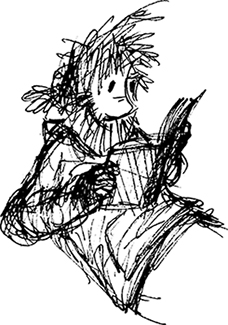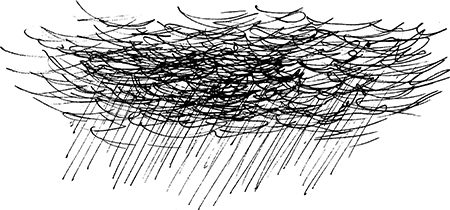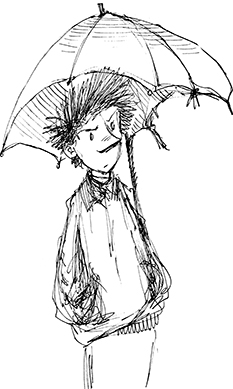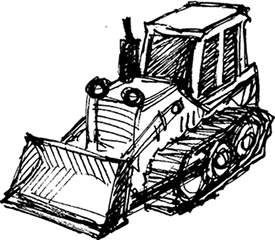
Neil stared out the window of the train at the gray London morning. They were passing over the river Thames before heading back underground on their way to the far south of the city.
It wasn’t raining, exactly. It was more like a constant misty drizzle that hung in the air and eventually stuck to the windows. Once there was enough moisture, the mist would form small drops, leaving streaks down the glass before finally succumbing to gravity.
“Lovely weather,” Neil said sadly. “It must take an hour for the water to actually hit the ground.”
The weather outside matched the mood in Neil’s heart. Sure, he’d escaped a month’s worth of homework and would be certain to grab a Royal Warrant in a few days (how could Neil Flambé not wow the royal family?). But he missed his kitchen.
And Isabella. She and Jones were in France, and she’d said she would try to fit in a trip to London, but it was far from certain.
He and Larry had been in London for two days already, and all Neil had caught was a slight head cold. They’d gone to Lane’s gigantic stone country house. It was empty. It looked, and smelled, like Lane had never even made it back there from the airport. Neil had sniffed around his office, his club, even his car. No trace of the honey.
The trail, like the weather, was cold.
“There certainly is a lot of Cynthia Paine,” Larry said. A book of English slang lay open on his lap, almost every page adorned with a sticky note. “That’s cockney for rain.” Larry took a sip of his coffee. He grimaced. It wasn’t bad, but it wasn’t the high-octane brew he made for himself back home. Still, the weak coffee and weather didn’t seem to dampen Larry’s natural enthusiasm for exploration.
“Oh! Here’s a great word. ‘Gongoozler, noun: a person who stares for a long time at boats and other stuff on canals’! Man, I thought I spoke English, but apparently not!”
Neil ignored Larry as best he could and tried to concentrate on the tiny bits of evidence they had so far. Larry had, cleverly, snapped more than a few high-resolution pictures of the honeyed paper. “Just in case the Nose gets back on the case,” Larry had said.

Neil pulled out his phone now and opened up the photos.
He zoomed in on the image of the fish, and it certainly looked to him like a key, with a fish-shaped bow. Neil knew the top of the key was called a bow because it was one of the first words Larry had recited on the flight over.
Neil hadn’t slept much.
He read the poem that was written under the key.
Turn thine bow upon the lock.
It windes the arms of yonder clock.
Point thee to a finer robe
As merry Drake goes round the globe.
Where, hidden, sits the stolen jewel?
Prithee, search thy tasteless gruel.
Then there was a series of tiny letters and numbers.
iviiiiiii
iii
iviiii
iiiivi
ivi
Poetry was not Neil’s thing. He preferred recipes, written down in identifiable chunks, with each line containing a specific amount, instruction, or ingredient. The poetry was in what you did with the recipe, or at least what Neil did, which was to take the same building blocks that everybody had available and then create the Taj Mahal.
But this just looked like more homework.
Then there was that other bit on the back.
Help comes to thee, Master Shakerags, for you will have need of this key, for thy witless head be empty, a brainless orb, and in need of a mappe, indeed, to complete thy journey.
“What the heck does that even mean?” Neil said out loud.
Larry looked over at his cousin. “Don’t be such a mungo.”
Neil didn’t even care what that meant, which didn’t stop Larry from offering a definition. “A mungo is someone who steals things from a trash bin.”
Neil frowned. “Sounds more like you than me.”
“Ha! It’s such a great word! I think I’ll rename one of the alley cats Mungo when we get back!”
“Can we please focus on this stupid mystery?”
Larry closed his book and smiled. “I knew you missed the adventure. Face it, we’re like Sherlock Holmes and Dr. Watson. The game is afoot!”
“I’m just a chef; I’m not Sherlock Holmes!” Neil said.

“I never said you were.” Larry smiled. “Holmes is a genius, who solves crimes using the power of his brain. I think I know which one of us is Holmes.” Larry pointed at a finger at his own brain.
“Watch it, that finger might be loaded. Your head certainly isn’t.”
“I deduce that you are feeling antsy. Fine, Watson, let us consider the evidence before us.”
“That’s what I’ve been doing!”
Larry ignored him. “We know that the honey is old, very old. ‘Shakerags,’ according to my mesmerizing dictionary, is an insulting term denoting ‘a disreputable, shabby person.’ ”
“But since the honey is old, very old, maybe it’s a reference to Shakespeare?” Neil recalled how much Lane loved Shakespeare, and how shaky his hands had been as he’d read the back of the paper.
Larry nodded. “Possibly, Watson. Drake was also alive around that time, assuming the reference in the poem is to Sir Francis Drake. He went around the earth in the late fifteen hundreds. It was a huge deal at the time.”
“And the numbers are a code of some kind. Which leads us where?” Neil said.
“Well, the honey is old, so we assume the paper is old. There’s something about a stolen jewel, some guy named Drake, and possibly a reference to Shakespeare. And we have a missing Lord Lane.”
The loudspeaker on the train interrupted their conversation. They’d reached the Elephant and Castle tube station. The station was at the heart of the south end of London, where the original honey jars had been found in a demolished factory.
They got off the train and walked up the slippery steps and back out into the drizzly day. Neil felt a chill and hitched his collar up as high and tight as possible. The view did nothing to warm him up.

There was a shabby pub just outside the station exit. Its walls were covered with graffiti, most of it rude. There were cracks—or possibly bullet holes—in at least two of the large windows.
Tall apartment buildings and what looked like an old shopping mall were covered in grime, and funneled a cold wind down the street.
Paper and garbage clogged the gutters, allowing the drizzle to accumulate into mucky gray pools.
Neil looked at Larry, who was grinning. “What’s so funny?”
“It’s just like home!”
“Sadly, that’s true,” Neil said. The area looked eerily like the part of Vancouver where Neil tried to make Chez Flambé a going concern. “What was a rich guy like Lane doing with a factory in this part of town?”
Larry shrugged. “Urban renewal, maybe? I read that this part of town is pretty rough.”

“You needed to read that? And you’re supposed to be Sherlock?”
“Ha-ha. Let’s just get to the site of Lane’s factory and see if there’s anything worth checking out.” Larry pulled out his phone and typed in the address. He pointed. “Thataway, Watson.”
They walked for a few blocks, passing numerous fish-and-chip shops, tiny parks, and run-down churches. Neil looked around nervously, but no one seemed to pay them much attention. After a few minutes they arrived at a bank of plywood barriers, with a chain-link gate.
Through the gate they saw a giant hole in the ground. Bulldozers and construction crews were gathered around. Many of the workers were on break, sipping tea and eating small cakes. Neil sniffed the air. “Honey and dried fruit scones . . . with Devon cream,” Neil said. Then he looked at Larry and pointed at his nose. “And the tea is a mix, mostly Darjeeling. Most of the workers seem to have added a splash of milk.”
“See? Who needs brains with a nose like that?” Larry smiled. “Is the honey old or new?”
Neil sniffed again. “Definitely new. Highly processed, a hint of preservatives and exhaust fumes.”
“Well, let’s join the construction workers and do a little digging, shall we?”
Neil nodded.
Larry walked through the gate and up to a man who was covered in mud but gracefully sipping tea from the lid of his thermos.
“Hello, my fine fellow. A bit early for a lunch break, no?”
“It’s time for elevenses, ain’t it?” said the man, taking another sip of his tea and sighing happily. “Lunch ain’t for another hour or so. Name’s Danny, by the way, and me blokes might not agree about the ‘fine fellow’ bit.”
“Danny. Lovely. I’m wondering if you can tell us anything about this location. There was, like, a big old factory here, right?”
The man took a bite of his scone and looked at Larry with a sideways glance. “This about the honey what we found?”

Larry nodded.
“The honey weren’t liquid gold, were it? It were just honey?”
Neil nodded this time. “Amazing honey, once I cooked it, of course, but just honey. Why?”
“It’s just that you’re the third person what’s asked me about it today.”